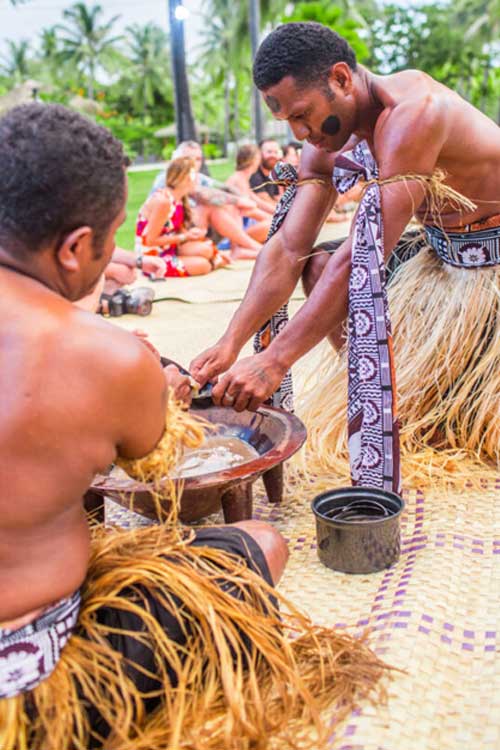
On a Fiji holiday, visiting a traditional village is high on the list for both first-time visitors as well as repeat travellers – for several reasons. A Fiji village visit is a great way to get to know an ancient culture, a lifestyle based around family- and community-centric social structures, and have a great day to boot.
But here’s a fact. When we enter a society which has rules carried over for hundreds of years, which are distinct and fascinating for us as travellers, it also stands to reason that they would have rules and expectations for guests, too. Before experiencing a Fijian village tour, the guides always go over the dos and don’ts. But for ace travellers, here’s a rundown of the same rules, but with ‘why’ answered. When there’s a reason and logic behind rules, they always make more sense and make a memory that much more colourful. So here are the etiquettes, dos and don’ts, rules (along with reasons!) for international travellers visiting a Fijian village!
When stepping into a traditional Fijian village, the act of presenting a ‘sevusevu’, typically a small bundle or packet of powdered kava, is more than just a formality—it’s a bridge of respect and connection. Kava, deeply rooted in Fijian culture, is not just a drink; it’s a symbol of communal harmony and respect.
The kava, made from the root of the pepper plant (piper methysticum, go check it out!) holds a special place in the hearts of Fijians. It’s not just a drink; it’s a gesture of peace and a key to their communal lands. In this moment, you’re not just a visitor; you become part of a longstanding tradition that has welcomed strangers from across the seas into the Fijian fold for centuries. This simple act of presenting kava is your first step into a world where traditions are cherished, and every guest is treated like family.
As you settle into the rhythm of the village, the sevusevu ceremony unfolds as a beautifully orchestrated dance of words and respect. Here, in the heart of the village, you become a part of an age-old tradition.
The ceremony begins with a dialogue that weaves together the fabric of respect and gratitude. It’s a verbal tapestry that has been passed down through generations, each word carrying the weight of tradition. As you follow your guide’s lead, remember to stoop low – it’s not just about moving to your spot, but a gesture of respect, a nod to the customs that have shaped this community.
Your guide might share tales of how this ceremony has been the cornerstone of Fijian hospitality for generations, a way for visitors to bond with their hosts. As you sit, perhaps cross-legged, in your allocated space, feel the warmth of inclusion.

Respectful etiquette takes centre stage on a village visit, particularly in how one presents themselves in the presence of the village chief. The conduct of oneself is often signifiers of offered respect to elders. An essential part of this respectful conduct is the removal of hats and sunglasses. This simple act goes beyond mere protocol; it is a profound gesture of respect and acknowledgment of the chief’s status and the village’s customs.
Visitors, as they stroll through the village, are often seen carrying their bags in their hands, rather than on their shoulders. This practice, subtle yet significant, aligns with the village’s ethos of humility and respect. It reflects an understanding and appreciation of the village’s values, and it’s a small but meaningful way to show reverence to the local culture and its leaders.
In the communal life of a Fijian village, courtesy and respect are paramount, especially when it comes to personal and shared spaces. Before capturing memories with a camera or entering someone’s home or a communal area, it is customary and respectful to first seek permission. This practice is not merely about adhering to rules; it’s a demonstration of respect for personal boundaries and cultural norms.
Fijians, known for their warmth and hospitality, often welcome such requests with a smile. A simple, polite inquiry before taking a photograph or stepping into a home reflects a visitor’s sensitivity to Fijian culture. It’s a gesture that acknowledges the villagers’ privacy and their right to consent, fostering a deeper sense of mutual respect. Moreover, the act of removing shoes before entering any village building is more than just a customary practice; it’s a sign of deference to the sanctity of their homes and communal spaces.
Minding the above two rules will go a long way in warming the local villagers in showcasing their village to you, often explaining little things and quaint idiosyncrasies which escapes the regular tourists.

Each Fijian village, with its unique tapestry of traditions and beliefs, also has its own set of ‘tabu’ (taboo) – cultural norms that are deeply ingrained and respected by the villagers. For visitors, understanding and adhering to these taboos is not just about following rules; it’s about showing a deep respect for the village’s cultural heritage.
A common taboo in many villages is the prohibition of touching someone’s head, which is considered sacred. This belief underscores the importance of being aware and sensitive to such local customs. Visitors who take the time to inquire about and respect these taboos demonstrate a genuine interest and respect for the village’s way of life, which is always appreciated by the locals.
In the tranquil setting of a Fijian village, the harmony and peacefulness are palpable. One of the key ways visitors can contribute to this serene atmosphere is by speaking softly. This practice of maintaining a low voice is more than just a matter of sound; it’s a reflection of respect for the village’s tranquil environment and its inhabitants.
Engaging in conversations with a respectful tone not only helps preserve the village’s peaceful ambiance, but also shows a visitor’s mindfulness and consideration for the villagers. This approach to communication is deeply appreciated, as it demonstrates a visitor’s sensitivity to the village’s culture and lifestyle.
Sharing a meal in a Fijian village is not just about enjoying the local cuisine; it’s an intimate gesture of community and belonging. When invited to join a meal, it’s a privilege that offers a rare glimpse into the heart of Fijian communal life.
Meals in the village are often communal affairs, eaten cross-legged on a mat, bringing everyone to the same level – a symbol of equality and togetherness. The ritual of waiting for the ‘masu’ (prayer) before eating is not just about blessing the food; it’s a moment of gratitude and unity, an essential part of the communal experience. The act of thanking the hosts after the meal goes beyond mere politeness. It’s an acknowledgment of the generosity and warmth with which the meal was shared, strengthening the bonds between guest and host and leaving lasting memories of a shared experience that transcends cultural boundaries.

Whether it’s learning to weave traditional mats, partaking in a kava session, or dancing to the rhythm of Fijian music, these activities offer an authentic glimpse into the village life.
Engaging with the locals in their daily routines and festivities is an enriching experience. It not only allows visitors to gain a deeper understanding of Fijian culture but also helps build meaningful connections with the community. The enthusiasm shown by visitors in learning and participating in these activities is often met with genuine appreciation by the villagers, as it reflects a respect and interest in their way of life.
In Fijian villages, Sundays hold a special significance as a day of rest, reflection, and religious observance. This tradition is deeply rooted in the community’s values, making most village tours unavailable on this day. For visitors, understanding and respecting this aspect of Fijian culture is crucial.
For those staying in a village homestay, Sundays present a unique cultural experience. Dressing in one’s best attire for the Sunday church service is a mark of respect and participation in an important weekly event for the villagers. The service, often accompanied by harmonious choir singing, is not just a religious gathering but a showcase of the community’s unity and spiritual fervor.
Even for visitors who do not share the same religious beliefs, attending a Sunday service can be a deeply moving experience. It’s an opportunity to witness the strong communal bonds and the spiritual depth that characterize Fijian village life. The experience offers a profound understanding of the values and traditions that are integral to the Fijian way of life, providing a memorable and respectful conclusion to the exploration of village customs and manners.
A visit to a traditional Fijian village is more than a journey through a picturesque landscape; it’s an immersive experience into a culture rich with traditions and customs. From the respectful offering of kava in the Sevusevu ceremony to the modesty in dress and the gentle conversation, each practice is a thread in the vibrant tapestry of Fijian life.
Respecting the sacred Sundays, joining in communal meals, and participating in the daily life of the village allow visitors to not just observe but truly experience the essence of Fijian culture. These interactions are not just about cultural exchange; they are about building connections that transcend the usual tourist experience. By embracing these customs and manners, visitors contribute to preserving the integrity and beauty of Fijian village life. Each respectful gesture, each moment of understanding, enriches the experience for both the visitor and the host community, forging memories and relationships that last a lifetime.
In the heart of Fiji’s villages, amidst the laughter, the singing, and the shared meals, lies the true spirit of Fiji – a spirit of community, respect, and a deep connection to the land and each other.
Check out our other Fiji blogs, Fiji holiday deals as well as our signature all-inclusive Fiji holiday packages – you’ll love how our South Pacific Specialists have included flights, stays, transfers, meals and drinks, and even little surprises like free WiFi, bonus tours and more! But if you already have a Fiji resort or favourite in mind, let us drum up a bespoke Fiji holiday holiday for you with group discounts for large families, ideas for romantic getaways and more. Call our Specialists at 1300 991 751!
Get exclusive access to discounts and deals - Enter your email address, subscribe to our mailing list and earn a $50 voucher to use against your first booking!